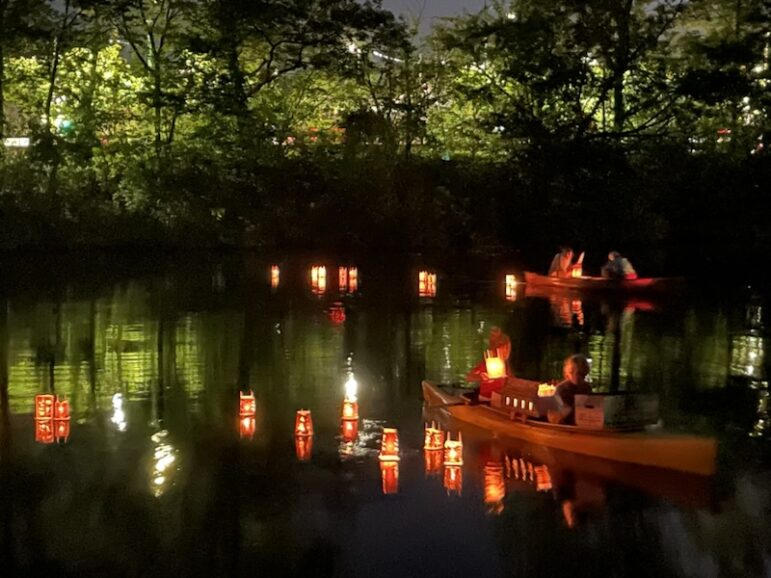
The following piece was provided by Watertown Citizens for Peace Justice & the Environment:
In 1912 Mayor Yukio Ozaki of Tokyo City, gave 3,000 cherry trees to Washington, D.C. to celebrate the growing friendship between the United States and Japan. Thirty-three years later, on August 6, 1945, the United States dropped the first nuclear bomb on Hiroshima and the second on Nagasaki three days later. Over 100,000 people’s lives were ended instantly and by the end of that year, over 210,000 people were dead. Countless others were maimed or suffered long-term effects of radiation.
In what he called his “anti-poem,” Original Child Bomb, Trappist monk and writer Thomas Merton described the events leading up to August 6 in a stark, bureaucratic style. As the work draws to a close, Merton refers to a phrase from a radio speech given by President Harry S. Truman on August 9, 1945: “We found the bomb, and we used it.”
Sadako Sasaki was a Japanese girl who suffered from leukemia from radiation exposure due to the Hiroshima bomb at age 2. She folded more than 1,000 paper cranes during her last days before dying in a hospital at age 12. Paper cranes have since become a symbol of hope for an end to nuclear weapons.
On Saturday, August 9, Watertown Citizens for Peace, Justice and the Environment organized Back from the Brink — Remembering the Bombing of Hiroshima and Nagasaki — 80 Years Ago, in Watertown Square. The annual event began with a silent vigil in the town where many held signs displaying messages such as “Imagine a Nuclear Free Future” and “Billions for Nukes = Zero for Kids, Healthcare, Food, Security, Housing.” After the vigil, the participants moved to the Watertown Delta where they were welcomed by Sue-Ellen Hershman-Tcherepnin and Tony Palomba. They heard speakers including Buddhist Monk Sensei Morris Sullivan, Owen Madus from Massachusetts Peace Action, and Todd Gross from Watertown Citizens for Peace, Justice, and the Environment. “Nuclear weapons are omnicidal,” Owen reminded the group. “Not only are they deeply immoral, they are insane. Human beings and nuclear weapons cannot coexist.”
Todd spoke about Watertown Citizens’ campaign to join 70 other cities in the United States (including 14 in Massachusetts) who have passed a Back from the Brink resolution, based on five points from the organization Prevent Nuclear War (preventnuclearwar.org), including pursuing agreements, ending the sole authority of any U.S. president to launch an attack, and taking U.S. nuclear weapons off hair-trigger alert. The resolution has been endorsed by multiple organizations, civic leaders, and elected officials, including Massachusetts Representatives Lynch, McGovern, Neal, and Pressley. Members of WCPJE have collected signatures of over 400 registered voters in Watertown and will present the petitions to the City Council soon.
The commemoration then moved across the street to the DCR dock on the Charles River with people holding paper lanterns. Suzy Giroux led the crowd in singing, and Rabbi Gregory Hersh and addressed the group, as well as two people from the crowd. Two canoeists floated candle boats on the river as Sue-Ellen Hershman-Tcherepnin serenaded the group with flute music.
Despite the sadness of the occasion, Sensei Sullivan told the story of the paper cranes and reminded those in attendance that, “Cherry blossoms always fall, but we can still prioritize peace.”
In between Mayor Ozaki’s gift of cherry trees and ours of a-bombs, it should be noted that there was a mutual exchange of tens of millions of deaths (estimates vary), the vast majority of which were courtesy of the Empire of Japan (to say nothing of the Empire’s myriad war crimes). Even excluding the war years, from the early 1930s, Japanese fascist forces decimated Chinese, Korean, Filipino, Indonesian, and “Indochinese” by the tens of millions.
These are not trivial numbers. They constitute a holocaust of Asian people by an empire that believed in its own ethnic superiority. That should sound familiar.
I don’t know what just punishment such an evil regime deserves, but the bombing of Hiroshima and Nagasaki (and of Tokyo before) were not mere punishments. They were harsh methods to avoid a harsher yet alternative: invasion of the Japanese islands themselves. They were unfathomably cruel, but they worked. After fourteen years of near continuous warfare across the Pacific, Japan surrendered in less than a week.
The Japanese have been a peaceful and enterprising people for eighty years. I don’t bring up this history to detract from the pain they endured, only to remind a forgetful world of the pain they inflicted. And why they had to be stopped